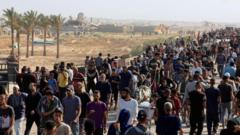**Amid growing humanitarian crises, a father's heartbreaking loss spotlights the dire need for international intervention.**
**Tragedy in Gaza: A Father's Grief After Israeli Airstrike Claims Young Life at Water Distribution Point**

**Tragedy in Gaza: A Father's Grief After Israeli Airstrike Claims Young Life at Water Distribution Point**
**An Israeli airstrike kills ten near a Gaza water point, igniting outrage and calls for an end to the conflict**
Mahmoud Abdul Rahman Ahmed is mourning the loss of his son, Abdullah, who died in an Israeli airstrike while searching for water in the Nuseirat refugee camp. On Sunday morning, Abdullah took the family's empty jerrycans to a water distribution point, a routine albeit dangerous task as the area struggles under a relentless siege and violence. Mahmoud described to a local journalist the minute details of that fateful day, recalling how children, including Abdullah, patiently queued with desperate hopes for relief.
“Minutes after they gathered, the warplanes bombed those children and the water point, without prior notice,” Mahmoud said. Graphic footage showed the aftermath: destroyed structures, yellow jerrycans scattered amidst chaos, and the anguished cries of women and men trying to rescue the fallen from the rubble.
The Al-Awda hospital confirmed that ten people were killed in the attack, six of them children. Abdullah and his peers, like Badr al-Din Qaraman and Lana Ashraf al-Ghussein, had aimed for a basic need far removed from the harsh realities of war. Mahmoud, desperate for the world to pay attention, criticized Israeli military operations and called for an end to the conflict that has persisted for 21 months.
The Israeli military initially claimed it targeted a "terrorist" from Palestinian Islamic Jihad but soon acknowledged a "technical error" had led to the deaths of civilians. The military expressed regret but offered little comfort to Mahmoud, who asserted that the targeted strikes served as a message of oppression against those simply seeking water. "They were just kids, dreaming of a future that can never be realized," he lamented.
As water shortages worsen in Gaza due to a lack of fuel and equipment, many residents receive far less than the emergency standards for daily water consumption, contributing to a growing humanitarian catastrophe characterized by what the UN calls a "human-made drought crisis." Sam Rose, the acting Gaza director for the UN agency for Palestinian refugees (UNRWA), noted children waiting daily for minimal water supplies, shedding light on the dire circumstances faced by families in the region.
Recent attacks have claimed many innocent lives, with UN reports indicating that a classroom's worth of children has been killed daily since the war escalated. Catherine Russell, UNICEF’s executive director, condemned the violence, calling it "horrific" and urging regulatory reforms to ensure humanitarian law is upheld.
Later this week, the UN Security Council plans to address children's welfare in Gaza, following a UK request. Nevertheless, Israel's representative shifted blame onto Hamas, accusing them of exploiting children as human shields. In stark contrast, Mahmoud called for a halt to military action, insisting, “We are just civilians; we do not possess weapons or power.” With appeals for international action reverberating, the humanitarian crisis in Gaza remains urgent and alive, demanding the world's immediate attention as families like Mahmoud's mourn their profound losses.
“Minutes after they gathered, the warplanes bombed those children and the water point, without prior notice,” Mahmoud said. Graphic footage showed the aftermath: destroyed structures, yellow jerrycans scattered amidst chaos, and the anguished cries of women and men trying to rescue the fallen from the rubble.
The Al-Awda hospital confirmed that ten people were killed in the attack, six of them children. Abdullah and his peers, like Badr al-Din Qaraman and Lana Ashraf al-Ghussein, had aimed for a basic need far removed from the harsh realities of war. Mahmoud, desperate for the world to pay attention, criticized Israeli military operations and called for an end to the conflict that has persisted for 21 months.
The Israeli military initially claimed it targeted a "terrorist" from Palestinian Islamic Jihad but soon acknowledged a "technical error" had led to the deaths of civilians. The military expressed regret but offered little comfort to Mahmoud, who asserted that the targeted strikes served as a message of oppression against those simply seeking water. "They were just kids, dreaming of a future that can never be realized," he lamented.
As water shortages worsen in Gaza due to a lack of fuel and equipment, many residents receive far less than the emergency standards for daily water consumption, contributing to a growing humanitarian catastrophe characterized by what the UN calls a "human-made drought crisis." Sam Rose, the acting Gaza director for the UN agency for Palestinian refugees (UNRWA), noted children waiting daily for minimal water supplies, shedding light on the dire circumstances faced by families in the region.
Recent attacks have claimed many innocent lives, with UN reports indicating that a classroom's worth of children has been killed daily since the war escalated. Catherine Russell, UNICEF’s executive director, condemned the violence, calling it "horrific" and urging regulatory reforms to ensure humanitarian law is upheld.
Later this week, the UN Security Council plans to address children's welfare in Gaza, following a UK request. Nevertheless, Israel's representative shifted blame onto Hamas, accusing them of exploiting children as human shields. In stark contrast, Mahmoud called for a halt to military action, insisting, “We are just civilians; we do not possess weapons or power.” With appeals for international action reverberating, the humanitarian crisis in Gaza remains urgent and alive, demanding the world's immediate attention as families like Mahmoud's mourn their profound losses.


















